That will change before long, as players burst in for afternoon practice. But for now, nothing stirs. Skates, helmets, and pads are lined up at each player’s station. Jerseys hang waiting.
“This is the calm before the chaos,” says Jamie Rice ’90, Babson’s ice hockey coach, dressed for practice in a sweatshirt and beat-up baseball cap, a whistle hanging around his neck. At each player’s place he has left a page full of motivational quotes about toughness, discipline, and overcoming adversity. “We try to give them something every day,” he says.
Rice has been around hockey teams his entire life, ever since playing for the Newton Seals as a 6-year-old in the early 1970s. He still remembers the name of the coach. “I could give you the name of every coach I’ve ever played for,” Rice says. As with many kids from cold weather climes, he fell in love with the sport. “Hockey is a part of who we are,” he says. “It’s part of the New England DNA. You grow up in the area, you need to learn how to swim and skate. You’ll do both of those things, depending on the season.”
Rice is one of a number of Babson alumni who have become hockey coaches at the high school and college levels, a fact that may seem surprising at first. “You wouldn’t think you would have that at a business school,” says Rice. But the consistent success that Babson’s hockey teams have had through the years, stretching back to the late 1970s and 1980s with coaches Steve Stirling and Rob Riley, then through Paul Donato ’84, P’13, and Rice himself, has inspired many to follow their lead.
And these alumni coaches still relish a team’s esprit de corps, that all-in-it- together feeling they first experienced as boys, bonding with teammates as they lugged their equipment to cold rinks for practices that happened at whatever off times the ice was available. “I love being a part of a team,” says Rice, “to have people who are behind you, good or bad, up or down.” Many years later, he remains close to his old college teammates, and he wishes the same for his own players. “Hockey brought us together, but the friendships and love keep us together beyond our time here,” he says.
The View from Center Ice
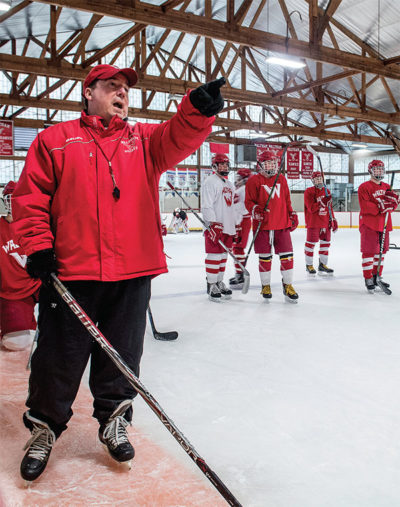
Photo: Billie Weiss
The longtime coach at Waltham High School, John Maguire ’82, P’16, calls himself a hockey “lifer.” He leads the Hawks through an afternoon practice at the team’s home rink in Waltham, Massachusetts.
Out in the suburbs of Boston, in the city of Waltham, the Waltham High School hockey team is about to start practice. The players pour out of the locker room, the door plastered with an image of a giant hawk holding hockey sticks. Above the door hangs a picture of Waltham’s 2002 team, which won the state title.
The rink is a no-frills place, with cinder-block walls and wooden beams that stretch across the ceiling. It’s also freezing. On the ice, the players whirl about, giant W’s on their jerseys, and the rink fills with the sound of skates scraping ice and pucks slamming against the boards.
Standing at center ice, players flying by him, is John Maguire ’82, P’16. For 32 seasons, this has been his spot, in the middle of the action as Waltham’s head hockey coach. His is a constant presence, not just at the rink, but in this city. “You become somewhat of a public person in the community,” says the lifelong Waltham resident who, beyond coaching hockey, teaches business at the high school, leads his team in frequent volunteer work in the area, and spent 23 years coaching girls soccer and another 13 coaching junior varsity baseball. When he goes to the local supermarket, he can’t help but run into people whom he has taught, coached, or volunteered with through the years.
Maguire initially didn’t plan on becoming a coach. While he played hockey at Babson and had an interest in coaching and teaching, he took a job at Raytheon as a production control manager after graduation. “Teaching and coaching weren’t profitable professions,” he says. But then a part-time job coaching J.V. hockey at Waltham opened up, and Maguire decided to take it. After work at Raytheon, he would rush over to practice. “I found I was looking forward to coaching,” he says. “I couldn’t wait to get there.”
Maguire enrolled at Suffolk University to earn a teaching certificate and decided to switch careers. Those close to him weren’t sure what to make of that decision. “The reaction from others was mixed,” he says. “I took a decent pay cut to go from one field to the other.” He also ended up teaching and coaching at his old high school, which made for a surreal experience. “Initially, it was quite an adjustment, having lunch with the same people you had as teachers,” he says.
Maguire has coached many a successful season at Waltham, though there have been losing patches, particularly during the early to mid-1990s. “We had a drought. In terms of wins and losses, it was a struggle,” he says. “But that’s not why you coach. It’s more than that.” Maguire sees hockey rinks and playing fields as an extension of the classroom. They’re places to learn about work ethic, determination, and character. “At the end of the day, it’s about the impact you have on athletes’ lives,” Maguire says, noting the many players who “have gone to good schools, good careers, and become good parents.” He takes pride in players who have played on college teams, and he has made sure to catch their games. One player, Jeff Lazaro, even went on to the National Hockey League. “The whole city was excited to see one of our own make it that far,” Maguire says.
In upcoming years, Maguire plans to step away from the classroom. He has no such plans for hockey. Every season still fills him with excitement as he takes a new crop of athletes and works to blend them into a team. “It keeps me coming back every year,” he says. “I’m a lifer. I’d like to coach as long as I’m physically and mentally able to.”
Keeps Me Young
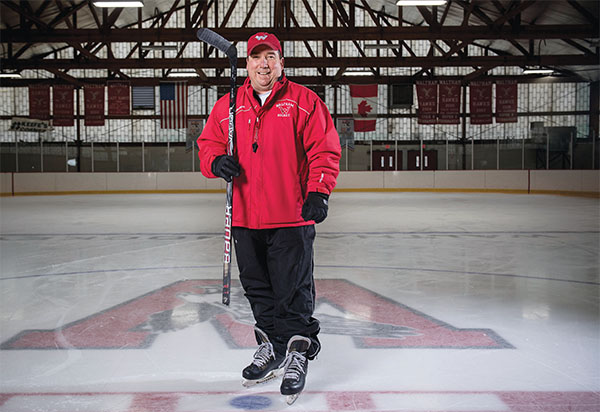
Photo: Billie Weiss
Waltham High School coach John Maguire ’82, P’16
When Maguire played hockey at Babson, his coach was Steve Stirling, who led the Beavers for 13 seasons. Stirling was Rice’s coach as well. Both Rice and Maguire say Stirling was an inspiring leader who taught them much about the game. “It was like an MBA in hockey,” Rice says. “He was such a wonderful coach.”
Jim Creamer ’90 remembers the moment that Stirling pulled him aside and suggested he should consider going into coaching. Today Creamer is the head hockey coach at Bishop Hendricken High School in Warwick, Rhode Island, but at the time he was a college hockey player, a bit immature by his own admission, and he wasn’t thinking about coaching as a career. Stirling’s words of encouragement caught him by surprise. “It had an impact,” Creamer says. “He was a big influence on me.”
When he graduated from Babson, Creamer began working in marketing at Unilever. More fatefully, he also took a part-time position at the University of Rhode Island as an assistant hockey coach. Creamer soon found himself drawn to the rink. “I really enjoyed it,” he says, “probably more than I anticipated.” After three seasons at the university, he became head hockey coach at La Salle Academy, a high school in Providence, Rhode Island, and stayed for seven seasons before coming to Bishop Hendricken in 2001. “I love being able to go to the rink every afternoon,” Creamer says. “It keeps me young.” Earning a master’s degree in education, Creamer also has worked for the past 20 years, first as a business teacher and the as a guidance counselor, for the Cranston Public Schools in Cranston, Rhode Island.
As a high school coach, Creamer deals with the growing pains of his young athletes. “Teenage boys have issues,” he says. “It’s a tough time. They’re dealing with social issues, family issues, academic issues. They’re dealing with the uncertainty of their future.” Inevitably, considering how much time he and his players spend together, Creamer finds out what’s on their minds. “I spend a lot more time with those kids than their math teacher does,” he says. Creamer does his best to talk to his players, to give them advice and challenge them. He enjoys seeing them grow, mature, and settle into their adult lives as the years go on. “I’ve watched them battle their issues and come through them,” he says. “If you stick around long enough, they end up being doctors and lawyers. That’s the great part.”
Being a high school coach also means dealing with players’ parents, who may become overzealous if they think their sons aren’t receiving enough playing time. That doesn’t bother Creamer. “They are parents who love their kids. We’re dealing with their prized possessions,” he says. “You have to respect that and understand that. We don’t always agree, but we move beyond that.”
Creamer’s teams at Bishop Hendricken have won four state titles, though he believes that players often learn more from losing than winning. “You have to learn how to lose well,” he says. “You have to learn to accept results and move on. That’s pretty applicable to life.” Dealing with the disappointment of a tough loss can help his young athletes better handle the bigger disappointments that life may present. “Losing a high school championship will not be the worst thing that will happen to them,” Creamer says.
Dress in Layers
When becoming a hockey coach, one of the biggest adjustments is simply the temperature of the rink. “When you’re coaching, it’s freezing,” says Mike Hoban ’12, head hockey coach at Needham High School. “You have got to layer up.”
The cold certainly wasn’t a concern for Hoban as a player; he was too busy skating and sweating. Hoban played at Babson and then gave professional hockey a shot for a year. Bouncing around among different minor-league teams, he played for the Pensacola Ice Flyers in Florida, the Dayton Demonz in Ohio, and finally the Fort Wayne Komets in Indiana. “It was a funny year, a lot of different teams, a lot of different faces,” he says. “At the end, I got injured. I was sitting around for two months in Fort Wayne with nothing to do.” After the year was done, Hoban was ready to move on. He took a job working in commercial real estate with Haynes Management in Wellesley. “You realize you’re not going to make the NHL,” he says. “You see the writing on the wall, that this is the highest level you’re going to make.”
But Hoban wasn’t ready to step away from hockey entirely. He missed the family atmosphere that comes from being on a team, something he enjoyed while playing under coach Rice at Babson, so he accepted a job as an assistant hockey coach in Needham in 2013. After two seasons, he was named head coach. (Another former Babson hockey player, Zeke Testa ’13, is a current assistant.) With practices and games on the nights and weekends, the job fits well with his work schedule at Haynes Management, and the team also offers a homecoming of sorts. Needham plays its home games at Hoban’s old stomping grounds, the Babson Skating Center. “It’s great going back,” he says.
Hoban took on a position with a lot of turnover. He was the fourth head coach Needham had seen in four years, which meant the players were stuck learning a new system every season. “It was hard on the players,” he says. “We struggled.” The team won just three games that first year, but as with the other alumni coaches, winning isn’t necessarily Hoban’s top priority. “They competed hard every night,” he says. “All you can ask of high school players is to show up every day and give their full effort.”
Hoban learned much about being a head coach that season. When he took over, he was just 26, not too far removed from high school himself. “I looked at that as an advantage,” he says. “Being in these kids’ shoes not too long ago, I know how to help them on and off the ice.” Still, he made sure his players understood that, despite his youth, he was firmly in charge. “You establish your role immediately,” Hoban says. “You can’t let them overstep.” Now in his second season leading Needham, he’s hoping for improvement, perhaps even a playoff spot for the team.
Hoban also has another goal. Simply put, he wants his players to enjoy themselves. As they grow older, he wants them to look back fondly on playing hockey. “A goal is for it to be a lasting memory of their high school careers,” he says. “Hopefully, they can come back after they graduate and still be fans.”
Down South
Dan Armstrong ’05 coaches hockey a bit farther afield, somewhere a lot warmer. He’s the head coach at the University of Mississippi in Oxford, a job that comes with a few hurdles. For starters, there’s no local rink, so the team drives an hour each way for practice. Opponents are spread out over a bunch of states as well. “It is a lot of time and lot of gas mileage,” says Armstrong. Depending on the time of year, he also monitors the weather before taking off on those long drives. “We tend to cancel practice for our own safety if tornado warnings start going out in full force,” Armstrong says.
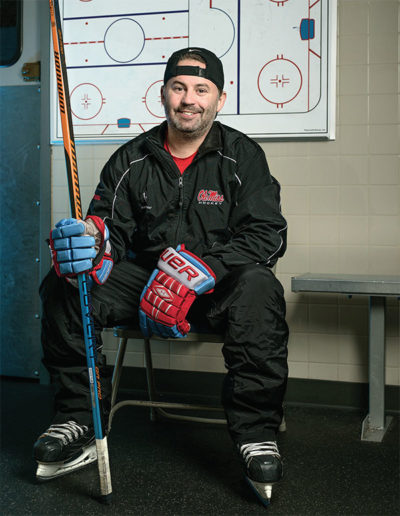
Photo: John Pittman
Dan Armstrong ’05, coach of the Ice Rebels of the University of Mississippi
Finally, players face the perception that good hockey, or even any hockey at all, is hard to find in their part of the country. To that view, Armstrong says: not true. “This is the stereotype we are trying hard to break,” he says. “It’s an uphill battle. I’m enjoying fighting it.”
Players from around the country come to play for Mississippi, says Armstrong. The Ice Rebels take on teams from the Southeastern Conference, a prominent athletic conference full of big schools and college football powers such as Tennessee, Alabama, and Florida. When recruiting players for Mississippi, this is a major draw. “You can have fun on the weekend with 100,000 of your friends at the football game,” Armstrong says. “It’s not the hardest sell in the world. You get the Southern lifestyle, and you’re playing a highly competitive brand of hockey.”
How Armstrong came to be a hockey coach in the South is a tale hinging on circumstance and a passion that was lost and then rekindled. Armstrong is originally from New Jersey, where he played high school hockey, and his dad was the general manager of an ice rink. Armstrong loved playing the game, but that would change. As a first-year student at Babson, he joined the club hockey team, and during a game an opposing player took a run at him. “The only way to put it is that it was a terrible, dirty, vicious hit from behind,” Armstrong says. He suffered broken ribs, a partially collapsed lung, and a back hurt so badly that it still isn’t quite right today. “I didn’t fall out of love with hockey, but I decided I didn’t need to play it anymore,” he says. “It stopped being fun at that point.” During the next 12 years, Armstrong only skated one time, just to show his fiancee, Amber Hodge, that he could.
Then Armstrong followed Hodge to North Carolina, where she was getting a master’s degree, and the couple ended up living less than a mile from an ice rink. He decided to lace up the skates and started playing hockey again. “The first time on the ice, you remember why you loved it,” he says.
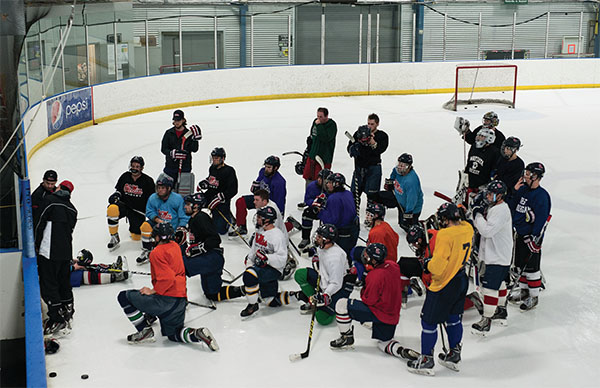
Photo: John Pittman
Dan Armstrong ’05 faces some challenges as a hockey coach in the South. With no local rink available, he and the Ice Rebels hold their practices at a facility an hour’s drive from campus.
When Hodge finished her master’s, she and Armstrong headed to Mississippi so she could pursue her doctorate. As they were looking for a place to live, their real estate agent mentioned that she knew the Mississippi hockey team’s coach, Angelo Rosena. Armstrong connected with Rosena, who soon asked him if he wanted to help out as an assistant coach. Armstrong said yes. “Sometimes things happen for a reason and you get lucky,” he says. “This is one of those times.” When Rosena moved on to a new position in 2016, Armstrong became head coach.
In that role, Armstrong juggles multiple responsibilities. He recruits players and raises money for the team (the Ice Rebels compete as a nonvarsity team and don’t receive much funding from the university), and he’s working to build interest in the construction of a community ice rink in Oxford. He also will tutor players if they’re having academic troubles. All these responsibilities take time, and Armstrong isn’t paid for his efforts. He works full time as a finance manager for Houghton Mifflin Harcourt’s trade division, and he’s grateful for his manager, who allows him to have a flexible schedule. “We do this because we love it,” Armstrong says. “It’s hockey, man. It’s a sport of love.”
Sitting in this Seat
Back at the Babson Skating Center, Jamie Rice sits in his second-floor office. When he steps out his door, he can look down on the ice and the many banners and photos commemorating past championships that line the rink.
Rice spends a lot of time at the skating center, and hockey is constantly on his mind. During the season he may arrive at Babson at about 7:30 a.m., leave 11 hours later to be with his wife and three children, and then sneak in some game tape later in the night. “It is all consuming,” he says. “There is always another game. You can always learn more. Finding life-work balance in season is my biggest challenge.” His office visibly seems to represent that challenge. On one side hang family pictures and drawings from his children. On the other hang team pictures from years past. “This is my life,” he says. “This is my life-work balance right here.”
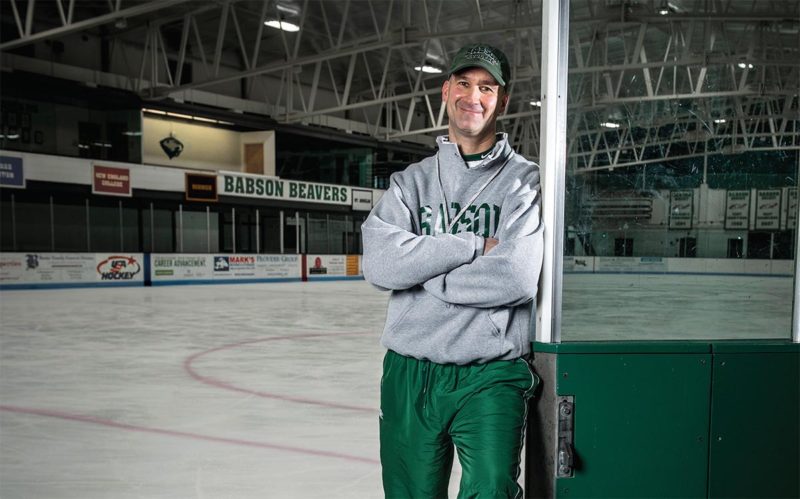
Photo: Billie Weiss
Jamie Rice ’90 works with his players at the Babson Skating Center, a place where he spends many hours every day, especially during the season.
Rice is now in his 13th season at Babson, during which time he has led the Beavers to four NCAA Tournament berths. Before Babson, he spent 14 years as an assistant coach at a variety of schools, including Colby, Dartmouth, Brown, and Northeastern. “I’ve never held a job outside of hockey,” Rice says. “This is all I’ve ever done. I’ve always wanted to coach or teach.” During those 14 years as an assistant, Rice worked hard and hoped for a head coaching job, but he didn’t anticipate landing at his alma mater. “It’s a place I love,” he says. “I never thought I’d be sitting in this seat.”
As a coach, Rice is aware of the stress his young athletes are under. They play a demanding sport and maintain a high level of academic rigor, all while growing into adulthood. Sometimes they need love, other times they need tough love. “Coaching is parenting,” he says. “It’s nudging them when they need to be nudged. It’s giving them a hug when they need a hug.” Rice feels pressure to prepare them the best he can. “I am still nervous before every game. Not that we won’t play well, but have I done everything I can?” he says. “Have we as coaches done enough so the kids can be successful?”
Once his players graduate, he hopes that all those days at the rink have, in some small way, helped prepare them for life beyond it. “Hopefully, as they step out the door, they are more independent, more prepared, for the next step,” he says. Wherever his players may go, he knows the bonds formed on the team are often for life. “I like to win,” he says, “but nothing gives me greater satisfaction than being invited to one of my former players’ weddings.”
]]>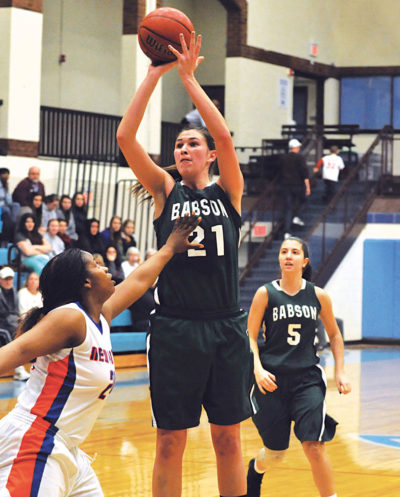
Photo: Mickey Goldin
Sarah Collins ’13
The women’s basketball team posted its second straight 26-3 record while going 18-0 in the NEWMAC for the fourth consecutive season. Babson qualified for its fifth straight NCAA Tournament, advancing to the round of 32 for the fourth successive season. The College won its fifth consecutive NEWMAC Tournament and fourth straight regular season conference championship while extending its league winning streak to 85 games. A WBCA and D3hoops.com All-American, Sarah Collins ’13 was voted ECAC New England and NEWMAC Player of the Year and was named to the first team for those conferences. Linnett Graber ’16 was selected NEWMAC Rookie of the Year.
Men’s Alpine Skiing
History was made during the men’s alpine skiing season. Babson secured the program’s best finish in its 10 appearances at the USCSA National Championships, placing third in the country. The Beavers’ lofty marks didn’t end there, as they also won their inaugural USCSA Eastern Regional title. Carter Dowd ’16 earned USCSA All-America honorable mention laurels in the giant slalom and ECSC Skier of the Year honors. Sam Barber ’16 and Graham Quisenberry ’16 were named USCSA All-America honorable mentions in the combined standings, and Dowd and Zach Breakstone ’13 were named to the All-MacConnell Division team.
Men’s Ice Hockey
The Beavers set two defensive records en route to winning their first ECAC East Tournament title since 2009. The team finished with a program best 2.20 goals against average, while goalie Zeke Testa ’13 broke his school record by producing a 1.85 GAA in 17 games. Going 18-7-5 overall and 10-5-3 in league play, the squad advanced to the NCAA Tournament quarterfinal round. Testa was named an AHCA All-American, ECAC East Goalie of the Year, and to the all-conference first team; Ryan Heavey ’14 earned second-team honors; and Jamie Murray ’16 picked up all-rookie team accolades as a goalie.—Scott Dietz, associate director of athletics
]]>